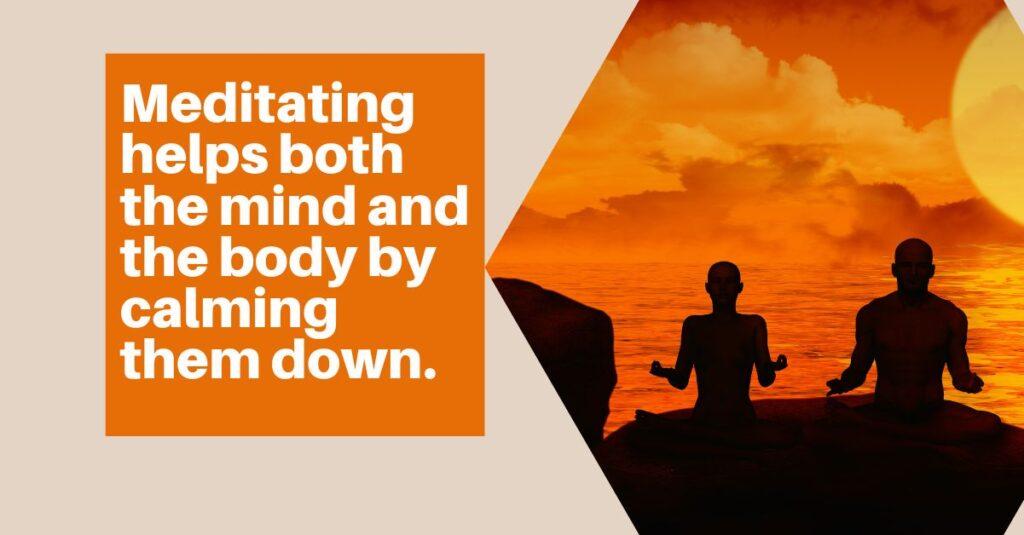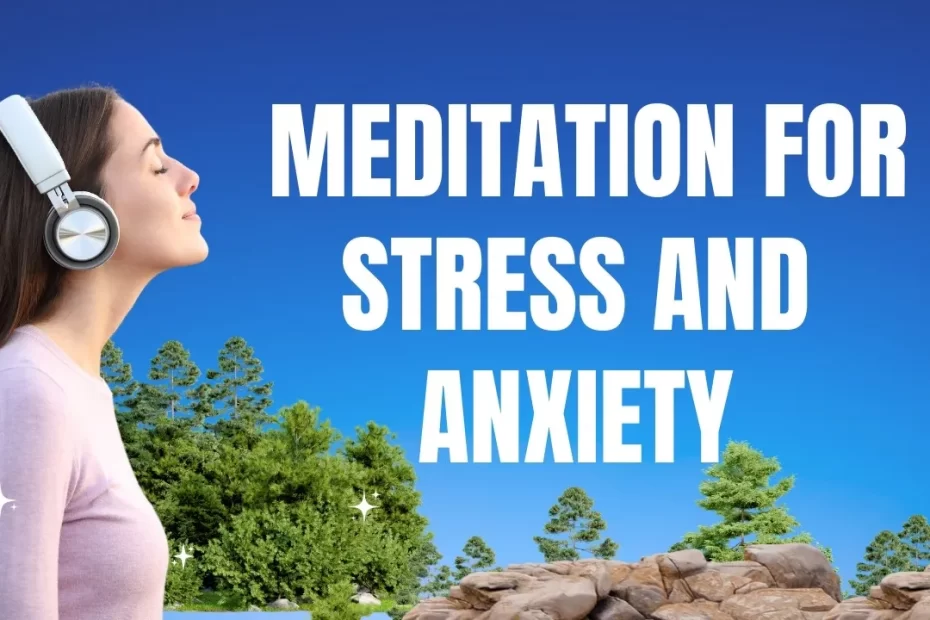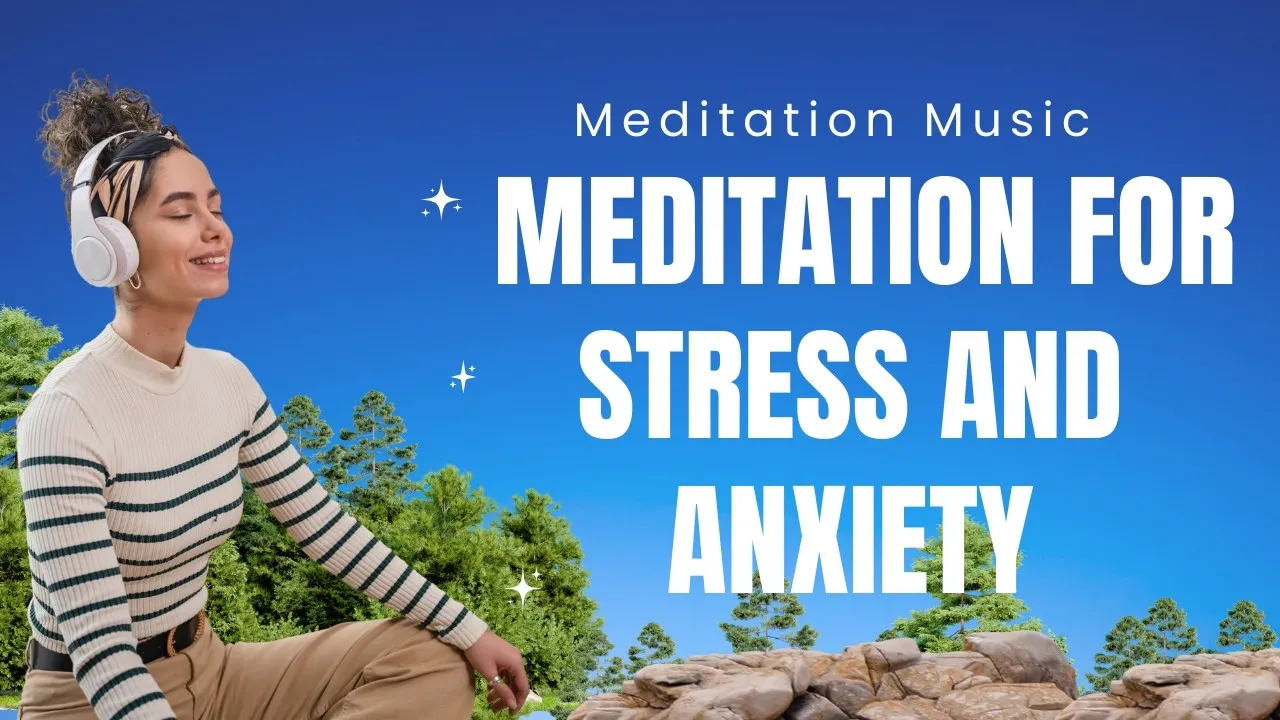Meditation with Music: Music has always played a vital role in our lives. Free meditation music is part of every aspect of our life from birth to death. Music has become integral to our daily lives, whether we listen to songs at home or go to dance clubs.
Music is such a powerful medium that it can even change our moods. The sound waves from music can stimulate certain brain parts, causing them to release chemicals that improve our mood. This makes music a great way to relieve stress and anxiety.
- How Meditation and Music Help Reduce Anxiety and Stress Naturally
- Meditation with Music: Benefits For Mental Health
- Source & Credits:
However, music can also cause harm to some individuals. If you suffer from depression, anxiety, or other mental health conditions, listening to loud music might worsen your condition. That’s why it’s essential to listen to music in moderation.
Meditation has been practiced throughout history, but scientific research has only begun to understand its value. Although meditation has historically been thought of as spiritual, it is now becoming increasingly understood for its positive effects on mental and physical health. Meditation is easier than it seems, and you can practice anywhere, anytime.
How Meditation and Music Help Reduce Anxiety and Stress Naturally
In a world that rarely pauses, anxiety has become a common experience for many. Whether it’s from work, social pressure, or personal struggles, stress creeps in and impacts not just our minds but also our bodies and relationships. Fortunately, two of the most accessible and natural remedies—meditation and music—offer powerful tools to manage stress and anxiety effectively.
Let’s explore how meditation for anxiety, paired with the healing power of music, can become a transformative part of your wellness routine.
Understanding Anxiety and How It Affects You
Anxiety isn’t just feeling nervous. It’s often a deep-rooted physiological and emotional response to perceived threats—real or imagined. Left unchecked, chronic anxiety can lead to:
- Insomnia
- Mood swings
- Difficulty concentrating
- Elevated heart rate
- Muscle tension
Traditional approaches like therapy and medication are beneficial, but meditation for anxiety offers a complementary, holistic path that you can practice anytime, anywhere.
Meditation with Music: Benefits For Mental Health
How often do you listen to music while working out or studying? If you don’t already, I bet you would love to start listening to some relaxing tunes during those times. Music has always been a great way to get into a relaxed state of mind.
The benefits of music go beyond relaxation. Research shows that listening to music can improve cognitive performance, increase productivity, reduce stress levels, and even boost creativity.
If you don’t meditate, then you should start doing so. Meditation has been practiced for thousands of years, but its effect on human bodies and behaviors is just beginning to be explored.
Social media says, “Meditation helps improve your brain function and ability to concentrate, memory, creativity, and feeling rejuvenated.”
Meditation With Music For Anxiety Reduction
Music has been shown to profoundly impact our emotions and mental state. When paired with meditation techniques such as deep breathing and mindful awareness, music can help quiet the mind, reduce stress hormone levels, and promote a sense of calmness and tranquility. This can be especially beneficial for individuals struggling with anxiety disorders or overwhelming stress.
Benefits of Meditation for Stress and Anxiety
When practiced consistently, meditation for stress and anxiety offers numerous benefits:
- Improved Emotional Regulation: You react less and respond more.
- Greater Self-Awareness: Learn to notice your thoughts without judgment.
- Reduced Physical Symptoms: Headaches, tension, and fatigue often lessen.
- Improved Sleep Quality: Nighttime anxiety becomes more manageable.
- Increased Resilience: You build inner tools to cope with future stressors.
- Reduces stress levels;
- Increases concentration;
- Contributes to memory;
- Develops mathematical-logical thinking;
- Strengthens creativity;
- Balances the emotional area;
- Reduces chronic pain;
- Ends generalized anxiety;
- Increases immunity.

Meditating helps both the mind and the body by calming them down
Research has shown that daily meditation can improve your ability to concentrate and multitask. It clears your mind and focuses your thoughts on the present moment, giving you a massive productivity advantage.
Mindfulness Practice For Mental Well-being
To practice meditation with music, find a quiet and comfortable space where you won’t be disturbed. Choose music that resonates with you and evokes feelings of peace and relaxation. Close your eyes, take slow, deep breaths, and allow the music to guide your meditation practice. Focus on the music’s sensations, letting go of any distracting thoughts or worries.
Anxiety Symptoms: Recommended Music for Anxiety Reduction:
- Classical music, such as piano or orchestral compositions
- Nature sounds, such as ocean waves, birdsong, or rainfall
- Ambient music featuring soft melodies and gentle rhythms
- Binaural beats or guided meditation tracks are designed for relaxation
Can Music Therapy Alleviate Stress and Promote Relaxation? Meditation To Sleep
Music therapy is a robust, evidence-based approach to reducing stress and promoting relaxation. By incorporating music into therapeutic interventions, individuals can experience a range of physiological, emotional, and psychological benefits that contribute to overall well-being. Here’s how music therapy can alleviate stress and promote relaxation:
- Stress Reduction: Music can influence the autonomic nervous system, which regulates bodily functions such as heart rate, blood pressure, and respiration. Listening to soothing music can trigger the relaxation response, reducing stress hormones such as cortisol and adrenaline. As a result, individuals may experience a sense of calmness and tranquility, helping alleviate physical and mental tension.
- Emotional Regulation: Music can evoke emotions and memories, providing an outlet for expressing and processing feelings. Through music therapy interventions such as listening to carefully selected music or engaging in creative musical activities, individuals can explore and process complex emotions associated with stress and anxiety. Music therapy techniques such as lyric analysis and improvisation can help individuals gain insight into their feelings, develop coping strategies, and foster emotional resilience.
- Distraction and Coping: Engaging with music can serve as a valuable distraction from stressors and worries, allowing individuals to temporarily shift their focus and relieve anxiety. Whether listening to music, playing musical instruments, or engaging in rhythmic activities, music therapy provides a healthy outlet for managing stress and coping with difficult emotions. By redirecting attention to the present moment and the sensory experience of music, individuals can feel relaxed and mentally clear.
- Promotion of Mindfulness: Mindfulness involves being fully present and attentive to the moment without judgment. Music therapy can facilitate mindfulness by encouraging individuals to immerse themselves in music’s sounds, rhythms, and sensations. Through practices such as deep listening, focused breathing, and mindful movement to music, individuals can cultivate a state of mindfulness that promotes relaxation, reduces stress, and enhances overall well-being.
- Enhancement of Social Support: Music has the unique ability to connect people and foster social bonds. Participating in group music therapy sessions or engaging in musical activities with others can provide a sense of community, support, and belongingness. Sharing musical experiences and creative expression with others can help individuals feel understood, validated, and accepted, reducing feelings of isolation and loneliness.
- Meditation to Sleep: Meditation helps you relax and fall asleep faster. It also reduces stress, anxiety, and depression. Try this simple technique to fall asleep fast: Sit up straight, back against a wall or a chair. Close your eyes and breathe deeply through your nose. Focus on your breathing until you feel calm and relaxed. Then, slowly open your eyes.
In summary, music therapy offers a holistic approach to stress reduction and relaxation by harnessing the therapeutic properties of music to address physical, emotional, and social aspects of well-being. Through active engagement with music, individuals can access a variety of coping strategies, emotional regulation techniques, and mindfulness practices that promote relaxation, reduce stress, and enhance overall quality of life.
How to Get Started with Meditation and Music
- Step 1: Choose Your Space
Find a quiet, comfortable place where you feel safe and won’t be disturbed. - Step 2: Pick the Right Music
Begin with free meditation music available on platforms such as YouTube or Spotify. Choose tracks with gentle rhythms, nature sounds, or healing frequencies. - Step 3: Use Guided Meditations
If you’re new to the practice, guided meditations are an excellent way to start. Look for sessions focused on meditation for anxiety, stress relief, or mindfulness meditation. - Step 4: Be Consistent
Commit to at least 5–10 minutes per day. Like any habit, consistency is key to reaping the long-term benefits.
Summary:
Discover the transformative benefits of meditation with music as a powerful method to reduce anxiety and promote overall well-being. This practice combines the calming effects of meditation with the therapeutic qualities of music, creating a soothing and immersive experience.
Incorporating this technique into your daily routine allows you to manage anxiety, find inner peace, and enhance your emotional well-being.





Remember the importance of quality sleep. Lack of sleep can affect your weight loss efforts
The profound impact of meditation with music as a powerful tool for reducing anxiety. This practice combines the therapeutic qualities of music with the calming effects of meditation, offering a transformative experience
Whether to practice meditation with or without music depends on personal preference and the specific goals of your meditation practice
These tips are a great reminder to prioritize self-care and mental well-being. Meditation and deep breathing exercises have truly made a difference in my life. Thanks for sharing this valuable advice!
Incorporating background music into meditation sessions can also aid in maintaining a consistent practice. The rhythmic patterns and soothing harmonies can serve as a cue for the mind and body to transition into a relaxed state
Meditation sessions with background music can be a powerful tool to enhance relaxation and mindfulness.
Your point of view caught my eye and was very interesting.
I love that feeling after a good yoga session, where my mind feels both calm and sharp. It’s like a reset button for my brain!